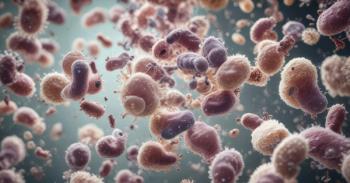
Impact of Therapies on Clostridioides Difficile Infection Development
Experts review the impact that medications, antibiotic or otherwise, may have on the development of Clostridioides difficile infection.
Episodes in this series

Transcript:
James A. McKinnell, MD: I’m going to put you on the spot for a little bit, but you are a PharmD, so I might as well ask, when we’re talking about duration of therapy, for an uncomplicated UTI [urinary tract infection], how many days?
Kelly R. Reveles, PharmD, PhD, BCPS:Probably 3.
James A. McKinnell, MD: Three days?
Kelly R. Reveles, PharmD, PhD, BCPS: Yes.
James A. McKinnell, MD: How about a community-associated pneumonia?
Kelly R. Reveles, PharmD, PhD, BCPS: Five.
James A. McKinnell, MD: And a health care-associated pneumonia?
Kelly R. Reveles, PharmD, PhD, BCPS: Seven to 10.
James A. McKinnell, MD: It’s really fun to have this conversation because from an infectious disease perspective, a lot of us were trained that duration of therapy for health care-associated pneumonia should be 14 days. It’s a hard transition, but the science here is clear that for most cases, 7 days is a phenomenal choice. Then the other question is on selection of antibiotics. The traditional teaching is, oh, avoid clindamycin. I might argue that now, it’s fluoroquinolones, but where do you stand on that? What’s your drug of the day that you’re worried about?
Kelly R. Reveles, PharmD, PhD, BCPS: I will tell you; I don’t have strong feelings about fluoroquinolones and I’ll tell you why. We have some data microbiome studies that show that the disruption of the microbiome following fluoroquinolones is probably not quite as impactful compared to some of our other more broad-spectrum agents. We did see a significant increase in Clostridioides difficileincidence in the 2000s related to the epidemic 027 strain and likely related to this big increase in fluoroquinolone prescribing, both in the inpatient and outpatient setting. That’s where we got scared about fluoroquinolones and thinking that they were associated with C diff, which I do think they are, particularly the 027 strain. But to me, carbapenems and our beta-lactamase inhibitor combinations are probably our big drivers. If you think about where those agents are typically used, they’re going to be in patients who are really sick and hospitalized patients, since they’re IV [intravenous] therapies, and patients who often will have underlying conditions. For using carbapenems, they are likely having other multidrug-resistant organisms. These patients are already at high risk for poor outcomes, are already hospitalized, so have increased risk for C diff exposure, and then you add on these big guns that are going to wipe out your gut. Those are the ones that I tend to worry about the most.
James A. McKinnell, MD: That’s right, there’s a context-dependency here.
Kelly R. Reveles, PharmD, PhD, BCPS: Absolutely.
James A. McKinnell, MD: Because the alternative story is if you look at the UK [United Kingdom] and their attempts to restrict fluoroquinolone use in the outpatient setting. What you’re driving at is stewardship in the right environment, and looking at need in both the outpatient setting, skilled nursing facility setting, long-term acute care, hospitalized patients. Each of these areas has a unique reality, and how to optimize for each of those is a different story. A topic that is also interesting is understanding the impact of other nonantibiotic-type medications, like PPIs [proton pump inhibitors] and others. How important is that? As an ID [infectious disease] guy, I’m going to say it’s all about the antibiotics, but is that right? Are there other things I need to think about, and how impactful are those sort of dynamics?
Kelly R. Reveles, PharmD, PhD, BCPS:Yes, we do know that there are other medications or even procedural exposures that increase the risk for C diff. I would say gastric acid suppressants are up there in terms of one of our other medication classes that we’re more worried about. We’ve seen in epidemiological studies that there’s an association between both PPI use and H2 [histamine 2] blockers in C diff risk, about double the risk of C diff in PPI users. A little bit less among H2 blocker users. For a long time, we just assumed there were changes in the gastrointestinal pH, and we now have studies to support that. Our group did a study a couple of years ago where we took an older, healthy adult population, and we gave them just 2 weeks of low-dose omeprazole, and then we characterized their microbiome diversity and composition from the pre-PPI exposure to post-PPI and looked at those changes. It was interesting. We didn’t see any major changes in diversity, but we did see a compositional shift in the abundance of different bacterial taxa, particularly at the phylum and family levels. We saw changes that we often see in C diff, like a reduction in certain firmicutes, phyla, and bacteroidetes. It’s a lead into potential mechanistic association between the microbiome, proton pump inhibitors, and C diff risk.
James A. McKinnell, MD: It is a paper I refer to, so nicely done. Thank you very much. It’s one of the ones that goes to the fellows. The other comment here to talk about is, Carl, you deal with patients who receive stem cell transplants and now heart transplants. What is that impact of immune suppression on this?
Carl V. Crawford, MD: When we think about C diff infections, it causes the infection by releasing a toxin in certain individuals. One has a second barrier of protection, which is the immune system, so the body is capable of making antibodies that can neutralize the toxin. If you were to lose some of those protective functions of your microbiota and C diff decides to produce a toxin, one can neutralize that toxin. If you have both arms knocked out, you have loss of colonization resistance and loss of immunity, then that’s the perfect storm. You’re going to have an infection. In those patients who are critically ill or patients who are elderly, they’ll lose the ability to mount these robust immunoglobulin responses against toxin A or toxin B and develop a C diff infection. The immunity is extremely important. At some point, we can talk about some of the therapies that we use for C diff infections that can address this in certain individuals who are sick or immunosuppressed.
James A. McKinnell, MD: Thank you for watching this HCP Live® Contagion® Peer Exchange. If you enjoyed the content, please subscribe to our e-newsletters to receive upcoming Peer Exchanges and other great content right in your inbox.
Transcript edited for clarity.
Newsletter
Stay informed on drug updates, treatment guidelines, and pharmacy practice trends—subscribe to Pharmacy Times for weekly clinical insights.






























